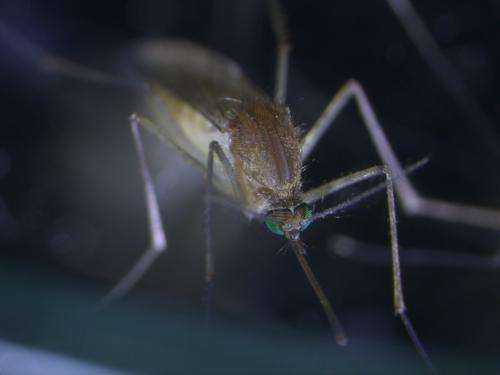Scientists have discovered how mosquitoes develop viral immunity

(Medical Xpress)—Published online in the prestigious Proceedings of the National Academy of Sciences (PNAS), the team from CSIRO's Australian Animal Health Laboratory, in Geelong, have shown Vago, a protein previously identified in fruit flies, is released by infected mosquito cells, providing a warning to other cells to defend against the invading virus.
Mosquito-transmitted emerging viruses, such as dengue, Japanese encephalitis and West Nile threaten the health of our people, livestock and wildlife. Globally, dengue infects 50-100 million people and results in around 22,000 deaths annually.
According to CSIRO's Professor Peter Walker, these insect vectors present a particular biosecurity risk for Australia as they are rapidly spreading into new areas driven by a number of factors including climate change and increased travel and trade.
"Difficulties in generating safe and effective vaccines for many of these pathogens present significant challenges due to their complex ecology and the range of hosts the viruses can infect," Professor Walker said.
"Until now, very little was known about the defensive anti-viral response of insects. Unlike humans and other mammals, insects lack key components of the immune response including antibodies, T-cells and many important cytokines, such as interferon."
Using West Nile Virus as their infection model, the research team has demonstrated that, although unrelated structurally, Vago acts in mosquitoes like human interferon.
"Mosquito cells can sense the presence of a virus by detecting its small genome, stimulating the secretion of Vago. The secreted Vago then binds to receptors on other cells, signalling an anti-viral defensive response to limit the infection," Professor Walker said.
"This is the first demonstration that such a mechanism exists in mosquitoes or any other invertebrate.
"We are now looking at how viruses such as West Nile and dengue overcome the defensive response of the mosquito and how we can use this knowledge to increase resistance to infection and decrease the efficiency of disease transmission."
CSIRO will also use this new knowledge to explore the use of Vago for the control of viruses in invertebrate aquaculture species including prawns and abalone.
















